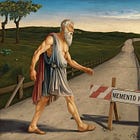The most notorious and disgust-generating piece of Stoic advice is the one that makes every moment come alive.
It makes me a better person whenever I remember to use it, rather than the heartless numbed monster so many readers imagine must result.
It is this:
“With regard to everything that is a source of delight to you, or is useful to you, or of which you are fond, remember to keep telling yourself what kind of thing it is, starting with the most insignificant. If you’re fond of a jug, say, ‘This is a jug that I’m fond of,’ and then, if it gets broken, you won’t be upset. If you kiss your child or your wife, say to yourself that it is a human being that you’re kissing; and then, if one of them should die, you won’t be upset.”
— Epictetus, Enchiridion, 3
“What! Kiss my loved ones goodbye each night, as if I may never see them living again! What sort of a heartless monster do you take me to be!”
People flip out about this. Whenever I write anything about “ends,” of which death is a critical subset, I get unsubscribes from this newsletter and way fewer likes. People are repelled by the idea. Perhaps I should have learned my lesson.
But I haven’t.
This newsletter is only part for you. And deep down I’d know myself to be a coward if I let this drop. So I will periodically dangle it before our noses with glistening banners and clinking bells. It’ll be good for us, I promise. And if I lose you as a result, I wish you the best.
The Truth About Monsters
The truth is this: people have it backwards. They think dragging the transience of loved ones and circumstances before their eyes will turn them into heartless monsters who feel nothing.
But it’s actually those who refuse to do this — who won’t acknowledge the most basic facts about existence — that often degenerate into unfeeling monsters. For what else can you call it when a lover, a parent, or even a connoisseur of places and things begins to take their loves for granted?
The lover is neglected, the cuddly toddler is assumed to never grow up, and only too late do we see what’s lost after the wildfire rips through the irreplaceable grove we barely appreciated.
These are the blunders of the ingrate who’s numb to fate’s blessings, who sees joys as permanent possessions to be hoarded instead of priceless loans that will all be returned. Stoic thought offers the solution and a way to enliven to our existence.
Think about Stoics like this: they find it life-changing to be hyper literalists about the most important things. That is what Epictetus means by “keep telling yourself what kind of thing it is.”
Cars break down. Mugs shatter. Humans die.
I’m typing this on a wonder machine that lets me effortlessly contact my subscriber hodgepodge in Sub-Saharan Africa, Indonesia, and North Dakota. But it’s going to break. It will become a brick. Today or tomorrow or six years from now, it will happen, and if I forget the nature of the wonder machine, I will both be pissed when it bricks and fail to appreciate it while I have it.
A Million Moments of Gratitude
“What harm is there while you are kissing your child to say softly, ‘Tomorrow you will die’?”
—Epictetus, Discourses, 3.24.87
My Dog:
I crane my neck and see my dog splooted out on the floor. She catches my glance, cocks her head, and wags her tail, hoping play time has arrive. She might be gone tomorrow, Andrew. What will you do?
My Love:
I lay beside my girlfriend in bed, each of us reading a book. She looks beautiful there, and I’m glad for her love and companionship. I hope to have her for decades. But lives and relationships all come to an end, Andrew. Will you take a moment to appreciate her?
My City:
I’ve lived in a beautiful city for 13 years. Its hot sun and cold spring-fed pools have delighted me, but now fate is calling me away. It is comfort to me how often I’ve appreciated it, but now the real question is, how will I use these last few months? Will I remember how good to me this place has been?
This is not an obligation. This is not drudgery. This is not sad. This is one of the most powerful happiness generators I know.
Turn it on and see the world come to life. Leave it off and be numb.
Meditation. Mantras. Journaling.
This age is awash in mindfulness, but still balks at eastern philosophy’s oldest insight — this too shall pass.
Everything ends.
Do yourself a favor and remember it.
Thanks for reading Socratic State of Mind.
If you liked this article, please like and share it, which helps more readers find my work.







This perfectly says why I’ve been drawn to stoicism but have been unable to express adequately to anyone else
Phenomenal. Death contemplation brings life appreciation. Profound piece as always